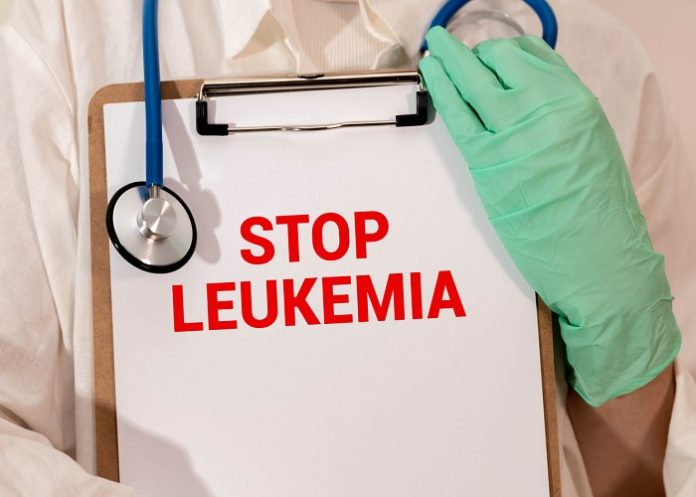A combination of targeted drugs, offering a chemotherapy-free approach to leukaemia, has been hailed as a milestone in cancer care by scientists after a recent British trial saw two targeted cancer drugs perform better than standard chemotherapy, halting disease progression in 94% of patients.
Potentially offering better outcomes for some patients as well as being more tolerable, it could reshape the way chronic lymphocytic leukaemia (CLL) – the most common form of leukaemia in adults – is treated, said the scientists of the Flair trial, which took place at 96 cancer centres across Britain.
The goal of the trial, which was co-ordinated by the Leeds Cancer Research UK Clinical Trials Unit at the University of Leeds, was to assess whether two targeted cancer drugs could perform better than standard chemotherapy among patients with CLL.
Sky News reports that 786 people with previously untreated CLL were randomly assigned to receive standard chemotherapy; a single targeted drug, ibrutinib, or two targeted drugs taken together, ibrutinib and venetoclax, with treatment guided by personalised blood tests.
Ibrutinib is a type of drug known as a cancer growth blocker. It works by stopping signals that cancer cells use to divide and grow.
Venetoclax blocks the functions of a protein found in CLL cells.
The researchers found that after five years, 94% of patients who received ibrutinib plus venetoclax were alive with no disease progression.
That compared with 79% for those on ibrutinib alone and 58% for those on standard chemotherapy, according to the study, which has been published in the New England Journal of Medicine and was presented to the European Haematology Association congress in Milan, Italy, last week.
Meanwhile, 66% of patients on the new combination had no detectable cancer in their bone marrow after two years, compared with none of the people who received ibrutinib alone and 48% on chemotherapy.
Experts said that the new treatment regime was also tolerated better than traditional treatments.
‘An era of truly personalised medicine’
Dr Talha Munir, consultant haematologist at Leeds Teaching Hospitals NHS Trust, who led the study, described the Flair trial as a milestone.
“We have shown that a chemotherapy-free approach can be not only more effective but also more tolerable for patients.
“By tailoring individualised treatment based on how well the cancer responds, we’re moving into an era of truly personalised medicine.”
Dr Iain Foulkes, executive director of research and innovation at Cancer Research UK, which funded the trial along with AbbVie and Johnson and Johnson, said: “The results of the Flair trial show we can provide kinder, more targeted treatment for the disease, giving people with CLL more precious time with their loved ones.
“We’re hopeful that the results will power new treatment options for leukaemia and other blood cancers.”
CLL is the most common form of leukaemia in adults, affecting the blood and bone marrow. While it cannot usually be cured, it can be managed with treatment.
Study details
Measurable Residual Disease–Guided Therapy for Chronic Lymphocytic Leukaemia
Talha Munir, Sean Girvan, David Cairns et al.
Published in New England Journal of Medicine on 15 June 2025
Abstract
Background
An interim analysis of progression-free survival in this trial showed that ibrutinib–venetoclax was superior to fludarabine–cyclophosphamide–rituximab (FCR) among patients with chronic lymphocytic leukaemia (CLL). Whether ibrutinib–venetoclax is more effective than ibrutinib alone is unclear.
Methods
In this phase 3, multicentre, open-label trial, we randomly assigned patients with CLL to receive ibrutinib–venetoclax, ibrutinib alone, or FCR. The primary end points were undetectable measurable residual disease (MRD) in bone marrow within 2 years in the ibrutinib–venetoclax group as compared with the ibrutinib-alone group and progression-free survival in the ibrutinib–venetoclax group as compared with the FCR group. A powered secondary end point was progression-free survival in the ibrutinib–venetoclax group as compared with the ibrutinib-alone group. Other secondary end points included overall survival.
Results
A total of 172 of the 260 participants (66.2%) in the ibrutinib–venetoclax group had undetectable MRD in bone marrow within 2 years, as compared with none of the 263 participants in the ibrutinib-alone group (P<0.001) and 127 of the 263 participants (48.3%) in the FCR group. With a median follow-up of 62.2 months, disease progression or death occurred in 18 participants (6.9%) in the ibrutinib–venetoclax group, as compared with 59 (22.4%) in the ibrutinib-alone group (hazard ratio, 0.29; 95% confidence interval [CI], 0.17 to 0.49; P<0.001) and 112 (42.6%) in the FCR group (hazard ratio, 0.13; 95% CI, 0.08 to 0.21; P<0.001). Progression-free survival at 5 years was 93.9% with ibrutinib–venetoclax, 79.0% with ibrutinib alone, and 58.1% with FCR. Death occurred in 11 participants (4.2%) in the ibrutinib–venetoclax group, as compared with 26 (9.9%) in the ibrutinib-alone group (hazard ratio, 0.41; 95% CI, 0.20 to 0.83) and 39 (14.8%) in the FCR group (hazard ratio, 0.26; 95% CI, 0.13 to 0.50). Sudden death occurred in 3, 8, and 4 participants in the ibrutinib–venetoclax, ibrutinib-alone, and FCR groups, respectively.
Conclusions
With extended follow-up and increased enrolment, our trial showed that undetectable MRD and extended progression-free survival were more common with ibrutinib–venetoclax than with ibrutinib alone or FCR. The results for overall survival were also consistent with a benefit of ibrutinib–venetoclax.
Sky News article – New leukaemia treatment hailed as ‘milestone’ in cancer management (Open access)
See more from MedicalBrief archives:
BTK inhibitor effective in leukaemia
Drug breakthrough offers hope for deadly blood cancer – UK study
US scientists discover alternative to toxic chemotherapy for cancer treatment

